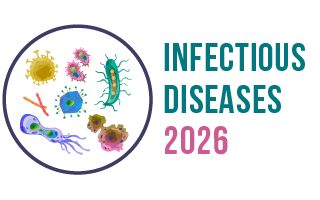4th International Conference on
Infectious Diseases
September 09-10, 2026 | Barcelona, Spain

Address: Avinguda Del Maresme 78 Ronda De Dalt Exit 15, 08940 Comella de Llobregat, Barcelona, Spain
Infectious Diseases 2026

University of Oxford, UK
Abstract:
Background: In conflict-affected settings such as Somalia, prolonged fragility and donor-driven programming have created parallel and siloed systems across human, animal, plant, and environmental health sectors. This fragmentation has constrained the institutional capacity to effectively respond to zoonotic disease outbreaks, food insecurity, climate-sensitive health risks, and antimicrobial resistance. The One Health approach offers a context-specific framework to promote cross-sectoral coordination, governance alignment, and integrated health service delivery. This study draws on stakeholder consultations and a comprehensive desk review to inform a roadmap for piloting an integrated One Health service provision model in Somalia.
Aim: To assess governance capacity, coordination gaps, and strategic imperatives for integrating One Health into Somalia’s national health system, with a focus on four core domains: human health, animal health, plant health, and environmental health.
Methods: A structured narrative synthesis was conducted in conjunction with more than 20 high-level stakeholder consultations involving federal and state ministries, academic institutions, non-governmental organisations, local service providers and technical partners across sectors. The desk review encompassed over 100 documents published between 1980 and 2024, including national policies, donor reports, and grey literature. Thematic analysis was organised across the four One Health domains, supported by political economy analysis, interpretive synthesis, and triangulation of qualitative and documentary data.
Findings: Stakeholders identified persistent challenges, including the absence of an institutionalised coordination mechanism, siloed policy development, donor-dependent and fragmented financing. Notable capacity gaps were reported in primary care and veterinary services, plant health systems, and environmental protection. Despite these constraints, consultations revealed growing momentum for piloting an integrated health service delivery model in Somalia.
Conclusion: Somalia’s experience demonstrates both the urgency and viability of integrating One Health into conflict-affected health systems. Stakeholders endorsed the piloting of an integrated, multisectoral service delivery model as a critical step toward improving health equity, system resilience, and pandemic preparedness. Key priorities include establishing a national One Health coordination platform, aligning policy and funding frameworks, and investing in cross-sectoral capacity-building. These lessons are highly transferable to other fragile and conflict-affected environments.
Biography:
Halima Mohamed is a researcher at the Nuffield Department of Primary Care Health Sciences, University of Oxford, UK, focusing on advancing primary care research and healthcare improvement.
